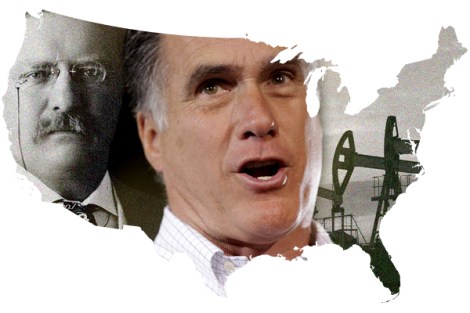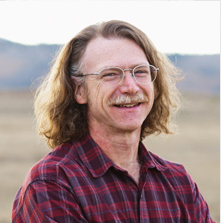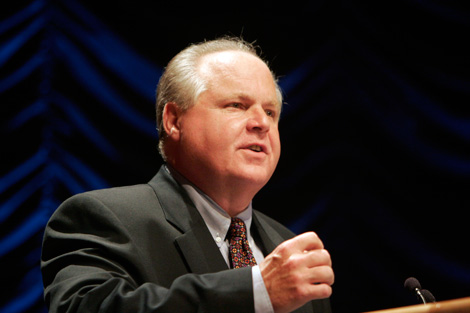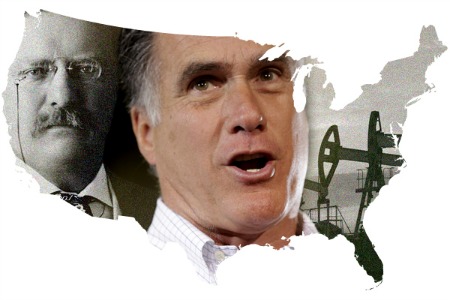
Photos by John Gress, Reuters / Shutterstock.
Standing amid the Permian Basin oil fields in New Mexico last week, Mitt Romney announced an energy plan that takes “Drill, Baby, Drill” to a whole new level. Handing states control over oil, gas, and coal extraction on historically protected federal lands, he chucked a century of bipartisan policy going back to Teddy Roosevelt. For Mitt, it’s “speak politely and carry a big drill.”
The moment reminded us — as you can bet we’ll be reminded again this week when the GOP convenes in Tampa — what the Romney campaign, to a large extent, is really about: the untrammeled freedom to extract wealth from the commons, whatever the costs to current and future generations.
But even more, moments like this offer a window onto what historian Mark Fiege calls “an environmental history of modern conservatism.” In his magisterial new book, Republic of Nature: An Environmental History of the United States, Fiege suggests that the conservative movement itself “gathered political power from the transformation of the American landscape and in reaction to the environmental, economic, social, and political crises generated by that transformation.” In fact, he goes on, “the modern conservative movement might be understood fundamentally as an argument about nature.”
That’s just one of the provocative insights in a book that fellow historians are hailing as a landmark of environmental history. And yet Fiege’s work challenges what we even mean by “environmental history.” The chapters are as much or more about people and iconic passages or events in the American past — the Salem witch trials, the Declaration of Independence, slavery and Lincoln and the Civil War, the transcontinental railroad, the atomic bomb, Brown v. Board of Education, the early-’70s oil crisis — as about “natural” environments. You almost wonder why Fiege calls it “an environmental history” at all. It’s just history, fully told.
 Which seems to be the point. While the book lacks a single, overarching narrative or argument (its chapters function as stand-alone essays on distinct topics), Fiege’s project is best seen as a kind of experiment. He demonstrates, case by case, what happens when you take the premise of environmental history — “that nature,” as he writes, “is central to the human experience” — and apply it to the kind of well-known subjects found in standard American history textbooks. “Within every famous icon, turning point, movement, or moment is a story of people struggling with the earthy, organic substances that are integral to the human predicament,” Fiege writes in his introduction, a brilliant set piece in which we’re asked to imagine ourselves ascending the steps of the Lincoln Memorial, that earth-bound temple, before unearthing the story of its construction.
Which seems to be the point. While the book lacks a single, overarching narrative or argument (its chapters function as stand-alone essays on distinct topics), Fiege’s project is best seen as a kind of experiment. He demonstrates, case by case, what happens when you take the premise of environmental history — “that nature,” as he writes, “is central to the human experience” — and apply it to the kind of well-known subjects found in standard American history textbooks. “Within every famous icon, turning point, movement, or moment is a story of people struggling with the earthy, organic substances that are integral to the human predicament,” Fiege writes in his introduction, a brilliant set piece in which we’re asked to imagine ourselves ascending the steps of the Lincoln Memorial, that earth-bound temple, before unearthing the story of its construction.
And yet, if Republic of Nature is fundamentally a book about how American history gets written, and what it looks like when it gets rewritten from a new or neglected perspective, it doesn’t deal much with the past 20 or 30 years — the era in which climate has become the overriding environmental (and more than environmental) issue. As I read, I wanted to ask Fiege how he thinks climate change will reshape our view of the American past — and how reinterpreting that past, including the history of the movement that gave us “Drill, Baby, Drill,” may help shape our future.
Fiege responded to my questions by email, over the course of a week, from Fort Collins, Colo., where he’s a professor of history at Colorado State University and director of its Public Lands History Center. The exchange below took place from Aug. 15-22, and has been lightly edited.
Q. I wonder how today’s children, years from now, from the vantage point of a continent and a planet — and, in all likelihood, a country — vastly altered by human-driven global warming, will view this nation’s history. I can’t help wondering how U.S. history as a whole, not just “environmental history,” may be rewritten as a result of climate. It seems it could very well change everything about how we view our past.

Mark Fiege.
A. Except for the chapter [on the early-’70s oil crisis], the book doesn’t say much about the global climate crisis. But I tried to make the story of the 1973-74 oil shock an account of the nation’s apotheosis — the petroleum-saturated “American century,” as Timepublisher Henry Luce called the 20th century, an era that helped to put into place an energy system that is now contributing to climate change.
Who knows what historians will do with climate, but the magnitude of climate and other profound problems — disease, energy, food, fresh water quality, ocean conditions, chemical toxins, warfare, and more — are simply too great to ignore and too great for historians not to ask how it is that we have come to this predicament. Environmental historians already are working on these issues: Mark Carey on glaciers and ice, Lawrence Culver on how Americans have understood and experienced climate — basically, a history of the United States through the lens of climate and perceptions of climate and climate change.
Maybe the surest sign that an awareness of climate is shaping historical consciousness will be when the popular historians turn their attention on it. When historians of the stature of Gordon Wood or Eric Foner — or, for that matter, David McCullough or Hampton Sides — focus on climate and other big-block environmental issues, then we can say that we truly are rewriting American history around the topic. As Frederick Jackson Turner once wrote, every generation rewrites the past according to the concerns uppermost in its own time. I think we are seeing signs that the rewrite is underway.
Q. So let’s talk about some specific questions that such a rewrite might address. For example, in the book’s last chapter, “Paths That Beckon,” you float the provocative idea of an “environmental history of modern [American] conservatism.” And you suggest that, in some ways, the conservative movement can be seen as a reaction to, and rejection of, not only environmentalism but actual, physical environmental pressures and “natural” limits — such as energy resources.
Now, with the Republican convention in Tampa getting underway, we’ll have an excellent opportunity to think about how that kind of historical perspective helps explain certain recurrent themes we’re likely to hear in the speeches. You know, not just the variations on “Drill, Baby, Drill,” but the outright contempt for the EPA (created, of course, in one of American history’s great ironies, by Richard Nixon) and for any attempt to regulate greenhouse emissions, or even to acknowledge the reality of human-driven global warming.
How might an “environmental history of modern conservatism” help us understand the current state of the Republican Party when it comes to issues of climate and energy? How did the party of Abe Lincoln and Teddy Roosevelt become the party of climate-science deniers and clean-energy opponents?
A. That is an excellent question, and here is how I would begin to think about it. During the 20th century, the United States put into place a system of policies, technologies, and infrastructures intended to extract mass quantities of natural resources from the Earth. Those resources established the material basis of the nation’s economic and military power, and they fueled — literally — a popular belief that the future would bring unending abundance and global dominance. Modern conservatism and its party, the Republicans, have become the last refuge of people still holding onto the vestiges of that older vision. Many of us, whatever our political beliefs, are deeply invested in the system that was intended to provide cheap fuel and food and to amass enormous wealth and power. Some people are willing to admit that the end is in sight; some, because the system still rewards them or because they still find the potential rewards alluring, are unwilling.
But I think the problem goes even deeper. A century of cheap hydrocarbon energy, especially oil, undergirded the construction of a transportation system that, by the late 20th century, enabled like-minded groups of Americans physically to separate from one another. It’s not as if Americans had never done this before; they had. But now the separation was a function of the modern hydrocarbon-fueled transportation system.
As I traveled across the United States promoting my book and visiting friends and family, the spatial separations in our society startled me. We have vast beige suburbs peopled largely by conservatives who most benefit from the hydrocarbon system but who are the most removed from its downsides, and many of whom attend giant drive-in mega-churches. We have the countryside with its rural conservatives who directly benefit from resource extraction or who are marginal to the entire economy and who struggle to provide for themselves. We have decrepit urban neighborhoods filled with disaffected people alienated from much of everything, especially the political system. And we have strikingly homogenous islands of moderate to liberal people centered on cities and neighborhoods such as Madison, Boulder, Berkeley, Capitol Hill in Seattle, Hyde Park in Chicago, Georgetown in the District of Columbia, Center City in Philadelphia, or, for that matter, Old Town and Mountain Avenue in Fort Collins.
It is important not to engage in stereotypes. Nonetheless, I think the general pattern holds true, and that it has corroded our social and political order, obstructed the formation of political coalitions that might move policy forward, and allowed conservatives to isolate themselves spatially from the rest of society and there perpetuate preposterous ideas such as that evolution is a lie or that global warming is a hoax. Vaclav Smil, one of our foremost scholars of energy, maintains that too much energy can foster social pathologies; perhaps, in light of modern American environmental history, he is correct.
Q. There’s a real element of tragedy, and of tragic irony, in many of your chapters: whether the story of cotton and slavery, the building of the transcontinental railroad, or the development of the atomic bomb. In each of these three cases, the effort to exert control over nature, both non-human and human, leads to incalculable suffering. Is the arc of our environmental history both tragic and ironic?
A. It’s ironic that the biological needs of enslaved laborers conflicted with, and sometimes undercut, the biological and agronomic needs of the cotton that the planters forced them to tend. It’s ironic that the railroad, a powerful agent of resource extraction and destruction (think of all that ore, all of those forests, all of those bison), now is one of our most energy-efficient forms of transportation. It’s ironic that the bomb, the supreme instrument of U.S. global power and domination, also is a source of profound instability and fear.
I draw this analysis of irony from the thought and writing of the [20th-century American] theologian Reinhold Niebuhr, who also had a lot to say about tragedy. Irony, Niebuhr said, often yields bitter laughter. (What fools we are!) When we see through the irony, we enter the realm of the tragic, and our laughter turns to tears. (Merciful God! What have I done? Or: Merciful God! What an awful choice I must make!) The ironic choice is the uncritical acceptance of the bomb or any other part of our hydrocarbon civilization. The tragic choice is the realization that we have bombs, reactors, refineries, dams, and so much more — the list is endless — and that we must steward these things while we build a new way of life that will minimize our reliance on them if not enable us to abandon them altogether. Or, if we want to stop using these things right now, then we must accept and cope with the immediate consequences of our actions.
Q. I was especially affected by the stories of the Manhattan Project scientists at Los Alamos, and the horror mixed with fascination that many of them felt when it became clear what they’d created. And I confess that I can’t help thinking we’re all a bit like those scientists now, here at the dawn of the Anthropocene — forced to contemplate what we’ve unleashed on the planet, and on future generations, including our own children and grandchildren. It appears that what our fossil-fueled industrial economies have set in motion is quite possibly as momentous, and potentially destructive, as the nuclear threat. How do you take that on board, both as a historian and personally (as if the two can, or ever should, be separated)?
A. We are in a Niebuhrian moment, but tragedy, as Niebuhr said, is not without hope. It is important for some people to retreat to principle and deliver uncomfortable criticisms; it is equally important for some people to take responsibility for environmentally and morally objectionable things, not to perpetuate them, but to control and dispose of them. Some people must take the courageous and tragic risk of the Nobel physicist Hans Bethe, who chose to keep his security clearance and work on the hydrogen bomb not because he believed in it — he didn’t — but because he believed that his work on it would give him the moral and political leverage necessary to help prevent its use.
I also wonder if some of us might reconsider our objection to words such as “growth” and “improvement.” If we believe, as Edward Abbey supposedly said, that growth is the ideology of the cancer cell, then we have conceded one of the most powerful and hopeful words in the American idiom to people who define it as the limitless extraction of resources from the Earth and the unending accumulation of wealth for the few. I believe we must seize control of that word and define it for what it is—an organic process that is at the heart of all the living things we hold dear, including our children, and that underlies our faith that springtime, rebirth, will come to us again. Same with improvement, a classic American concept deeply engrained in our nation’s history — let’s redefine that word to describe our ongoing, patriotic effort to learn about nature and align our lives with it in innovative ways that will make us better, sustain us and other living things, and maintain our republic for as long as possible, if not forever.
Niebuhr said that living in an awareness of humanity’s tragic limits—including its natural, physical limits—brings us closer to God’s grace. As scholar and citizen, in all that I do, I’m a flawed and tragic child. But the study of American environmental history has confirmed my belief that the past holds innumerable examples of possibilities that, if followed, can bring us closer to a future that we want and must have.
Q. That idea of “improvement,” as you show in the book, was central to the life and thought of Abraham Lincoln. And for Lincoln, it wasn’t just about canals and infrastructure, but our whole relationship to “nature,” and what kind of a people, and a republic, we would be — whether or not we had it in us to “improve” ourselves, find our “better angels.”
And by putting Lincoln so squarely at the center of your book, you also put race at the center of it — and justice. Maybe “justice” — social and environmental and generational justice — becomes the most important word in the American lexicon now. And maybe figures from Sojourner Truth and Frederick Douglass to W.E.B. Du Bois and Martin Luther King Jr. (to name a few), point us to the only kind of politics, and political leadership, that can redeem us.
A. By the time I completed the book, I was convinced that the black freedom struggle, and black conceptions of it, compose the defining theme in the American experience — that African American history is, in effect, American history.
The story is about redemption, about a group of Americans redeeming themselves and in the process redeeming the republic by compelling it to fulfill its greatest promise. It is providential, a kind of alternative manifest destiny that is not about conquest, but about a people rescuing their shared future and realizing their ultimate purpose. It also occurs in nature. The people migrate through toil and trouble and an awesome landscape in search of shelter and repose, a place where they can align themselves with God’s vision for the Earth.
Without dismissing the story’s separatist strains, it is possible to see universalism in it. Like King calling out from the mountaintop, it says, in effect, come join us, because this journey, this struggle, ultimately is the struggle of humanity itself. I suspect that if we are to create an optimal future for the next generation, our chances increase to the extent that we can adopt some version of this inspiring story.



